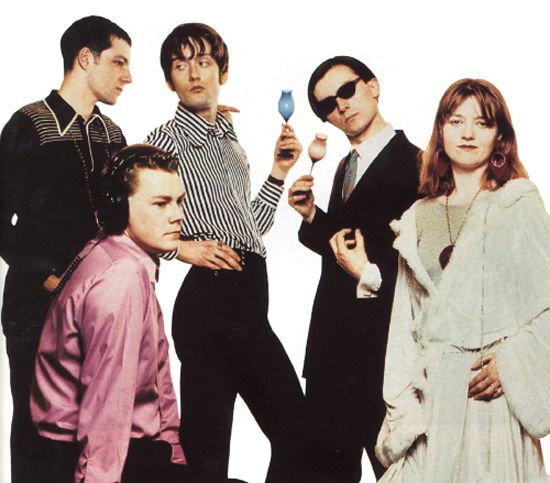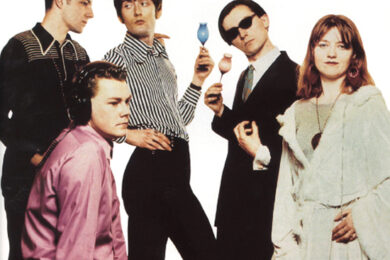Pulp Peel Sessions – The Wireless, 1981, 1993, 1994, 2001
Listen to the Pulp Peel Sessions on Spotify
Out of all the bands that were unfortunately lumped in with the Britpop movement, it was Pulp who had their roots most firmly in what came before: the UK indie underground of the 1980s. And with that came the patronage of John Peel, who heard an early Arabacus Pulp demo cassette and promptly invited them down to London to play their first session on November 7th 1981. These four early tracks, including the excellently-titled ‘Turkey Mambo Momma’, have a curious energy, ramshackle post-Fall exuberance rubbing against the Steel City synth tradition – you can really sense that this was a group hoping that appearing on the show they clearly loved might propel them to bigger things. It was twelve years later and1993 before they’d be back with a new found confidence and the libidinous, electronic ‘Pink Glove’ and ‘Acrylic Afternoons’, both of which appeared on His & Hers. The four 1981 tracks are arguably a stronger introduction to prototype Pulp than the subsequent Countdown compilation that was disowned by Cocker as "a garish old family photograph album". The Peel Sessions collection also contains the excellent ‘Mile End’, taken from the Trainspotting soundtrack, an unromanticised portrait of East End life that seemed to cock a snook at Blur’s knees-up-muvver-braahn mockneyisms.
‘My Legendary Girlfriend’ (single)
It’s hard to pick the moment where the brilliance of Pulp as a pop band – seedy, intense, original, yet with a catchiness and wry everyman approach that could make them chart-toppers – first became really clear. For me, it’s always been ‘My Legendary Girlfriend’, one of the songs that were written and released during Pulp’s difficult years when the 80s became the 90s. As such, the release history is rather confusing: a 7" on Bob Stanley’s Caff Records came in 1992, two years after Fire’s original 12", and the track finally appeared on the Separations LP. This in itself was released long after it was recorded, thanks largely to the band’s troubled relationship with Fire Records. (The opening of Luke Haines Bad Vibes adds a certain colour to that story). The track is Pulp at their best, a beat that owes more to dance music than the guitar groups of the period, (even those trying to engage with Acid House) synth stabs, a hot and heady build, and Cocker veering from breathy whisper to plaintive chorus, a geographically specific ("Creeping slowly past the cooling towers … / Deserted factories /…. Oh Pitsmoor Woman") ode to a love that’s probably not going to work out.
Intro: The Gift Recordings (compilation album)
You can’t avoid Pulp’s hometown on this 1993 compilation of three singles released for the Gift label. Oddly enough, it’s the Pulp record I’ve returned to most often in the intervening years, in part because it paints such a vivid picture of place. It’s hard not to see Cocker’s portrayal of Sheffield as shaped by a lifestyle that involved journeys up and down the M1 to London, where he’d recently finished studying at St Martins College. The tracks veer from the imperious pop that Pulp were then starting to execute with remarkable ease – ‘Stacks’, ‘Razzmatazz’, ‘OU’, an early version of ‘Babies’ – and their often overlooked experimental side. This is best heard on the heady opener ‘Space’ that ends like a Human League-soundtracked fairground ride spinning out of control, and ‘Sheffield Sex City’, one of their best songs. Cocker recites areas of Sheffield "Wombwell… Catcliffe… Brincliffe… Attercliffe" before keyboard player Candida Doyle starts reading a book about hearing people having sex in the steamy urban night “within minutes the whole building was fucking. I mean, have you ever heard other people fucking, and really enjoying it?" The track becomes a house-influenced track about a city whose inhabitants prowl neon streets in search of a bed to lie in, and a stranger to embrace. Intro ends with the triptych ‘Inside Susan: A Story In Three Parts’ a trio of tracks that prove Cocker was becoming as adept as sweetly observed character portraits as he was the mucky stuff.
‘Do You Remember The First Time?’ (video)
‘A promo video is simply an advertisement for a song’ reads a card held up at the start of the video for ‘Babies’. This is to do Pulp a disservice, for they were one of those all-too-rare groups who retained a brilliant, coherent aesthetic that extended to all aspects of their work, from videos to sleeve art and stage design. They were deeply involved in the nitty gritty of how to present their music to the wider public- perhaps in part a result of the fact that they’d been excluded by said public for so long. The video for ‘Do You Remember The First Time?’ was a partner to a short film featuring the likes of Jo Brand, Justine Frischmann and Bob Mortimer discussing their first sexual experiences. The promo video, with its seasickness-inducing rotating set was, according to Cocker, heavily influenced by British artist Tony Hill, whose work involves the use of unusal perspectives and shooting techniques. Pulp’s video ended up as a giddy and gritty narrative of young love and sex. And not for the last time in a Pulp video, it made good use of a shopping trolley.
‘Common People’ (single)
May 22nd, 1995. Almost 16 years ago to the day. I remember doing a GCSE exam, and heading straight into town to buy the new single from Pulp, rushing home, listening to it and deliciously naughty b-side ‘Underwear’, and reading over and over the message on the sleevenotes: "There is a war in progress – don’t be a casual(ty). The time to decide whose side you’re on is here. Choose wisely. Stay alive in ’95." It felt like a message, Jarvis Cocker whispering in your ear. Alright, so this is the obvious choice of Different Class-era Pulp, and the malevolent hiss of ‘I Spy’ is a superior song, but there’s really no underestimating what a colossal impact that this song had when it was released. The wider social and political importance of ‘Common People’ has been explored in masterful fashion by Dorian Lynskey in this article, so no more on that. But it really did feel as if Cocker and Pulp, with this bizarre, angry, brilliant and beautiful song, were delivering a glorious, triumphant charge for people who wanted their pop intelligent, suave, and smart. It felt as if our side was winning. Yet ‘Common People’ was, unfortunately, a phyrric victory. Three months later, smart English pop was the fish & chips wrapping as the dreary Blur versus Oasis chart battle hit the tabloids, and the lumbering Sasquatch of Britpop donned its mod shirt and suede shoes, and ruined British guitar pop for the next 16 years.
Glastonbury 1995 (festival appearance)
There was one final rally, though, when Pulp were last-minute replacements for the Stone Roses at the hot, sunny Glastonbury Festival in 1995. I remember sitting on the sofa, sick as a parrot that I wasn’t there (had thought I wouldn’t have been allowed, turned out I could have gone), watching the performance unfold on the TV screen. You could feel the atmosphere like static pouring from the screen as Pulp won over tens of thousands of people stood in a Somerset field, Cocker on fine vocal form not only in song, but also wonderful chatter with the crowd. Like ‘Common People’, his patter proved that this former darling of John Peel in his peculiar suit and ties was quite ready and keen for mass acceptance, the idea that music could create something positive, and affect change. Pulp at Glastonbury 95 did have one downside, though: ever since, broadcasters and journalists have got themselves into a twitch as, like a drug addict trying to recreate that first hit, they annually perform an unbecoming and desperate attempt to define the "Glastonbury moment". Pulp’s triumph was unplanned, unexpected, and entirely in character – the clever misfits elbowing their way to the top table, and delivering the best after-dinner speech.
The V Festival, 1996
Given that the V Festival is now an annual hell of major brand-sponsored landfill indie and the more moronic end of dance music, it’s surprising to remember that it started life in 1996 as Pulp’s very own Festival, with a line-up picked by the band themselves. Pulp asked along Denim, Gary Numan, and Jonathan Richman, alongside bands who, as Britpop became increasingly moribund, blokey and bloated, would fly the flag for invention and eccentricity from the Celtic fringe – Gorky’s Zygotic Mynci and Super Furry Animals. Tricky and Orbital in the dance tent showed Pulp were very much part of the end of genre tribalism. Halfway through the planning process, Virgin came on board as sponsors, though it’s unclear whether Beardy Branson should be blamed for the presence of Cast and Heavy Stereo on the bill. Pulp walked onstage to a robotic voice intoning "Please understand. We don’t want no trouble. We just want the right to be different. That’s all." It was this message of positive individualism that Pulp so ardently championed, and what has become so lost subsequently in the corporate co-option of independent culture. Perhaps it ought be played at the V Festival every year.
This Is Hardcore (deluxe edition album)
Listen to This Is Hardcore on Spotify
To say that it was always going to be tricky for Pulp to record a follow-up to Different Class would be a colossal understatement. By the time the band went into the studio to record the record, Cocker was struggling with the pressures of being a media star. He’d become a regular fixture of telly programmes like TFI Friday and Shooting Stars and the pages of the tabloids. At the same time, he seemed to have acquired an unfortunate taste for turning up to the opening of an envelope, and one of those wraps Pulp got into bother for showing you how to make on the sleeve of ‘Sorted For Es And Whizz’. As a teenager for whom Cocker was an inspiration, at the time he seemed to be turning into everything he’d spoken out against, something he discussed in this 2008 interview. This Is Hardcore, then, is a strange, flawed album. Records that deal with, or are haunted by, the fame of the person or people making it, are rarely a rewarding listen, but Pulp just about pulled it off thanks to Cocker’s self-excoriating honesty. To my ears, some of the record feels a bit Pulp-by-numbers, the band struggling to redefine themselves against the Britpop culture they’d inadvertently helped to create, but were really so far apart from. This is why I’d say the reissue of the album is the essential purchase, containing as it does a bonus disc of excellent tracks like the sketch of ‘It’s A Dirty World’, or the strange wheezing electro of the ‘My Erection’ demo. Yet on the main disc, the title track is one of Pulp’s best, a cinematic exploration of an obsession with seamy erotica that arguably has even more resonance in today’s increasingly pornified culture, and closer ‘Glory Days’ is a bittersweet confessional that still manages to be a rouser, an honest and not terribly fond farewell to Pulp’s 90s, if you will. Unfortunately, the actual decade would continue for two more years.



